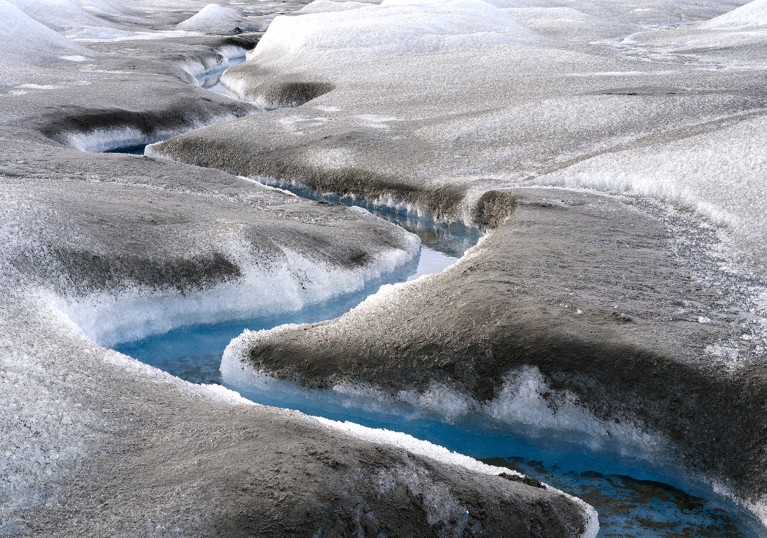

Brown sediment marks rapidly melting ice on the Greenland ice sheet.Credit: Martin Zwick/Reda&Co/Universal Images Group via Getty
Brown sediment marks rapidly melting ice on the Greenland ice sheet. Even at present levels of warming, the ice sheets in Greenland and Antarctica are at risk of irreversible collapse that could boost sea levels this century and beyond.
News
Climate change has placed the world in danger of breaching numerous planetary ‘tipping points’, according to a scientific assessment compiled by more than 200 scientists. Crossing those points could lead to irreversible effects on natural systems that are crucial to human livelihoods. For example, large parts of the Amazon rainforest could be replaced by savannah with as little as 2 °C of warming. “These tipping points pose threats of a magnitude that has never been faced before by humanity,” says climate scientist Tim Lenton, who led the report. The report also points to ‘positive tipping points’ — some of which, such as a shift to solar and wind power, are already in progress — that could result in runaway benefits for the climate.
Some scientists remain wary of overemphasizing tipping points, because it’s difficult to define the risks and assess their likelihood. But few researchers doubt that the risks are real — and that we must accelerate efforts to prevent them.
Reference: Global Tipping Points report
News
Scientist Rebellion, an international group of researchers that uses civil disobedience to prompt climate action, has organized protests across 23 countries during the 2-week COP28 meeting in the United Arab Emirates (UAE) — rather than demonstrate at the event itself. Participants told Nature that they feel disillusioned with the progress from past COPs and the fact that this year’s event is being hosted by a major fossil-fuel producer. They also want to avoid the carbon emissions required to get to Dubai and the risks that come with the UAE’s strict laws limiting protest and free speech. In an open letter, Scientist Rebellion urged scientists and academics to join them. “We need you,” says the letter. “Wherever you are, become a climate advocate or activist.”
Opinion
When wildfires engulfed California in 2020, climate scientist Daniel Swain put his research on hold to answer journalists’ questions and speak to the public about the science behind the disaster. Many others with relevant expertise would do the same, he says, but a lack of tangible support from institutions is holding them back. “Climate scientists are ready and waiting to meet the communication and engagement challenges that the coming years will bring,” he writes. “Forward-thinking institutions and funders must urgently find the means to support them.”
Opinion
“The planet cannot afford delays, excuses, or more greenwashing,” writes climate leader Catherine McKenna in a United Nations report on how to hold ‘non-state actors’ — industry, financial institutions, cities and regions — to account on their net-zero promises. Researchers need to rise to this challenge by scrutinizing disclosures, targets and metrics for progress, and advising on what they should look like, argues a Nature editorial.
Reference: United Nations report
Source link




